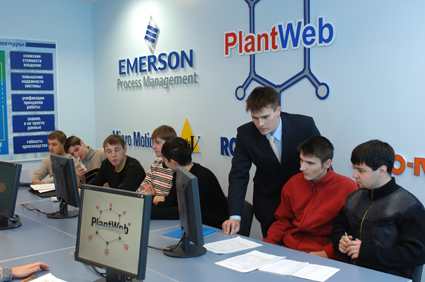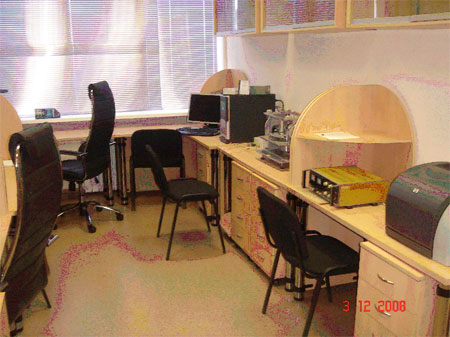The Laboratories of the School of Electronics and Computer Sciences is a world-class laboratory formed together with industrial leaders in the area of electronics and control systems.
Intelligent measurement tools laboratory

The laboratory of the industrial group “METAN” was founded in the department of Informational Measurement Technologies and is a modern academic complex necessary for the study of the newest means of automating the control of technological processes and industrial units for metering thermal energy. The laboratory is used in courses “Intelligent measurement tools” and “Measurement and metering of heat-carrying mediums”.
The laboratory includes intelligent sensors for pressure and temperature with 4-10/HART output and flow sensors with analog and digital output. The laboratory contains the necessary functional apparatus for the building of typical units for metering thermal energy and the circuit for controlling technological processes. The laboratory includes all necessary tools for verifying sensors for temperature and pressure. In completing laboratory work students become acquainted with a wide range of modern tools used in the manufacture of instrumentation. The laboratory includes computer stations which realize the joint work of the metering channel with the computer. Students master the programming of system, local, and instrument interfaces and the interfaces of peripheral equipment.
Intelligent measurement systems laboratory

The laboratory is founded from the newest tools from world leaders in the manufacture of automation tools, Emerson Process Management (USA) and ZAO Industrial Group “Metran” (Russia).
The laboratory is divided into two parts. One is the location for laboratory stations and the second for the simultaneous education of 12 students. The education zone is equipped with six work stations with personal computers and a work station for the instructor. The laboratory installation has two hydraulic circuits and allows for the control of temperature, pressure, flow, and fluid level within these circuits.
In addition, this installation allows for the regulation of the temperature of the internal space from radiators included in the system’s hydraulic circuit. This laboratory system imitates a system of energy metering and energy regulation in enclosures. The system is built with the use of intelligent field instruments which are connected to the DeltaV system controllers by fieldbus. The intelligence of the instruments implies wide functions of self-diagnostics and the ability to shift control to separate elements of the system on the field level. The functional possibilities of the FOUNDATION Fieldbus allow to grant control functions to the system element which will most effectively realize them, which reduces the controllers’ workload and increases system reliability as a whole.
Control and navigation laboratory

The goal of the laboratory is to enable laboratory lessons for students with the specialties “Aircraft control systems”, “Automated systems of processing information and control” and the master’s program, “Theory and mathematical methods of systemic analysis and management in technical systems,” and also enable the execution of experimental scientific research in navigation and movement control.
Tasks completed in the laboratory
For the academic process:
Laboratory lessons in the following topics:
- Study of the operations of sensors of non-platform inertial navigation systems (NINS);
- Study of NINS operations;
- Determining inaccuracies of NINS sensors;
- Determining NINS inaccuracies.
For research work:
- Testing the developed NINS to control its operation algorithm;
- Testing the developed NINS to determine inaccuracies of its sensors;
- Testing the developed NINS to determine its accuracy.
Informatics and control laboratory

The goal of the laboratory is to enable lab work in “Organization of computers and systems”, “Programming in high level languages”, “Systems of real time” courses, and also the provision of a laboratory base for executing scientific research work in the digital control of industrial machines and actuators.
Tasks completed in the laboratory:
For the academic process:
Laboratory work in the following topics:
- Microcontroller programming;
- The use of microcontrollers’ internal settings;
- Work with external digital signals;
- Work with external analog devices;
- Synchronizing time and events of processes;
- The use of IBM-compatible computers for the control of technological instruments.
For scientific work:
- The use of laboratory instruments to measure electrical and temporal values;
- The use of laboratory station microcontrollers to debug control programs and programs for gathering sensor information;
- The creation of measurement and control complexes using IBM-compatible computers and microcontrollers of robotized control systems.
The workplaces are equipped with the lab stations “Programming microcontrollers of the firm Atmel ATMega8535” and “Programming microcontrollers of the firm MicroChip”. Each lab station contains: a personal computer, lab installation “NEC microcontroller”, oscilloscope GDS-620, signal generator GFG-8215A, power supply HY3005D-2.
Laboratory of automation and control of technological processes

The laboratory was opened as part of a joint academic project with leading manufacturers of instruments of industrial automation and control and measurement instruments, Swiss company “Endress+Hauser”.
The laboratory is fitted with high-class, modern industrial equipment. The central space of the laboratory is occupied by a full-size laboratory installation for simulating thermal energy systems, which executes a full cycle of the technological process and includes subsystems for the generation, transport, and use of thermal energy, and also a chemical treatment system.
The main function of the laboratory is the education of the university’s students in disciplines connected to industrial automation and the control of technological processes. The new laboratory gives students the chance to receive modern, world-class technical education, become acquainted with modern industrial resolutions in the area of controlling technological processes and master technical skills of installation and operation of modern control measurement instruments and means of automation from the world’s leading producer.




